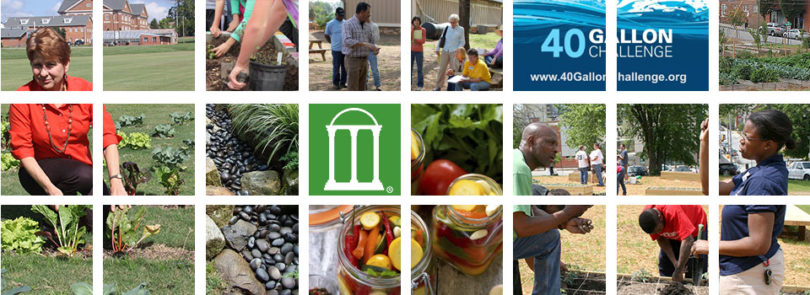With the growing popularity of backyard chickens and home food preservation, it does seem everything old is new again.
As today’s suburban and urban families are looking to their rural grandparents’ lives for lessons on how to live more healthily and sustainably, many are rediscovering University of Georgia Extension as a place they can find information they need to make green dreams a reality.
As UGA Extension-the original DIY Network-moves into its second century, it’s ready to help families reconnect to the land and protect the environment.
UGA Extension has been in the sustainable living business since Congress created the Cooperative Extension Service with the Smith Lever Act of 1914. With that act, Congress challenged each state to create a network of agents who would be able to share the latest in agricultural and home economics research from land-grant universities with farmers and their families who otherwise would have limited access to the university system.
In those first years, UGA Extension agents fanned out across Georgia to help farmers battle erosion and soil depletion and develop crops that would thrive in Georgia without expensive fertilizers and irrigation.
Today, UGA Extension is still helping farmers produce food while caring for their land and the environment, but Extension agents and specialists now have a broadened focus-helping families start community gardens, protect water resources and build more energy-efficient households.
Focusing on urban agriculture
“We were born into the issue of sustainability,” said Ellen Bauske, program coordinator of the UGA Center for Urban Agriculture in Griffin, which coordinates research and training programs focusing on everything from household pests to urban farming.
“We were right there during the Dust Bowl to help farmers save their farms from erosion, and we’ve been leading the way in sustainable farming since the beginning. Any long-term farming has to be sustainable, and we’re good at that. It just makes sense for us to use the tools that we’ve developed for those programs for urban sustainability and urban agriculture.”
In 1998, UGA College of Agricultural and Environmental Sciences’ administrators set up the UGA Center for Urban Agriculture as an interdisciplinary hub to tackle environmental and agricultural issues that impact Georgia’s urban areas.
The center now helps faculty and agents, coordinating training for pesticide applicators, landscaping crews, urban foresters, nursery operators, homeowners and gardeners. It also helps conduct research into how urban landscaping, pest control and water use affect the state’s environment.
Providing that ongoing training to lawn care, pest control and nurseries helps these companies run more efficiently, but it also allows them to use the most ecologically sound methods possible. Optimizing day-to-day chemical use for lawns and homes across metro-Atlanta may not be glamorous, but it has a huge impact on water quality and the health of urban and suburban-ecosystems.
“Tree, garden and turfgrass cover, land use, and appropriate pesticide and fertilizer application all impact sustainability,” Bauske said.
Water conservation and quality
The center helps UGA Extension agents across the state implement water conservation programs like smart irrigation and xeriscaping workshops and the 40 Gallon Challenge, a UGA-launched, website-based campaign that encourages people across the country to save water and provides tips on how they can save an extra 40 gallons every day.
The website — www.40gallonchallenge.org — launched during the 2011-2012 drought, 1,741 Georgians have pledged to save more than 300,000 gallons of water per day simply by being mindful of water use.
The center also provides training to county Extension agents on how to care for septic systems, grow food and ornamental gardens and help reduce erosion and storm water runoff. People come to UGA Extension agents for advice on their lawns and gardens and receive the most-current information about caring for their lawns more sustainably.
“Most people started coming to me with ways to get around the watering restrictions we had at the times,” said Mary Carroll Sheffield, UGA Extension agent for Paulding County.
“But when they did, they’d learn how to do more with less water and still take care of their lawns. … I guess if I was in sales I’m trying to sell people best practices for their homes. I tell them, ‘we’re talking about lawns here tonight, but we’re also talking about water quality and that what you do on your lawn matters.'”
Agents like Sheffield work with county water conservation offices to help families conserve water-lessening the burden on the state’s water resources.
“I think it’s on people’s minds, and I think the public is more careful with water,” Sheffield said. “When we started, we taught people how to make rain barrels because you couldn’t buy them; you had to make them yourself. Now you can find them at almost any home store. I think that indicates that the state is thinking differently.”
Many UGA Extension agents work with local gardeners who are certified as UGA Master Gardener volunteers to spread the word not just about water use, but about water quality. A current push focuses on septic tank care and clean-scaping-the art of landscaping around a septic tank to protect water quality.
“It’s not glamorous, but it has a huge impact on water quality,” Sheffield said.
Cleaner storm water runoff and reduced water use have a sizeable impact on the bottom lines of county and city utility departments as well.
Providing fresh food
While pushing for proper septic tank care and smart water use may not grab headlines, UGA Extension efforts have caught the eyes of families across the state as agents and volunteers work with teachers, community organizers and others to establish community and school gardens.
In addition to on-call advice from urban Extension agents, urban farmers can now find information on funding, garden organization and care and connect with other community gardens through new Web-based resources.
Becky Griffin, an educational program coordinator with UGA Extension in Cobb County, created a community garden blog (blog.extension.uga.edu/communitygardening) aimed at letting community gardeners and urban farmers across the state learn from one another’s triumphs and challenges.
School gardens can face their own challenges, and UGA Extension developed a set of resources for those garden organizers, too.
The UGA School Garden Resource Center (extension.uga.edu/k12/school-gardens) serves as a clearinghouse for lesson plans to help teachers use school gardens while adhering to Georgia’s Performance Standards. It also provides advice and resources on how to fund, build and maintain an active school garden.
Georgia’s Master Gardener Extension Volunteers and Extension agents helped create hundreds of school and community gardens over the past five years. For more success stories about UGA Extension’s involvement in urban agriculture, see environmentalsciences.caes.uga.edu/news.cfm.
Each summer, agents and volunteers in metro Atlanta counties and other Georgia cities provide dozens of gardening and food preservation workshops to help meet the public’s demand for homegrown produce.
In Athens-Clarke County, Master Composter volunteers work with UGA Extension agent Amanda Tedrow and Clarke County’s solid waste reduction team to promote composting to help meet the county’s waste reduction goals. To that end, they provide composting workshops, help build compost bins at community and school gardens and help troubleshoot backyard compost bins for local families.
On the farm, in town and on the move
As the demand for local food grows, UGA Extension is helping in-town farmers and farmers who live around metro areas make their small farms as productive and efficient as possible. They are also helping build markets for their produce.
UGA sustainable agriculture researchers are investigating marketing systems, like food hubs, as well as soil and crop challenges that are particular to small, sustainable, organic and urban farms.
Some of what farmers and agricultural scientists know about sustainable farming is just as applicable on a South Georgia peanut farm as it is in fields of heirloom tomatoes in metro Atlanta.
One of the goals for UGA Extension’s next century is to increase its role as a go-to source of information for sustainable living in Georgia, across the gnat line and across county lines.
“It’s in our strategic plan for the UGA College of Agricultural and Environmental Sciences that we want to increase our presence in urban areas in Georgia,” said Steve Brown, former assistant dean for UGA Extension. “We’re working on that now. We have to be more conscious of telling people about the Georgia-specific, research-based information we have on sustainable living and what that means.”





